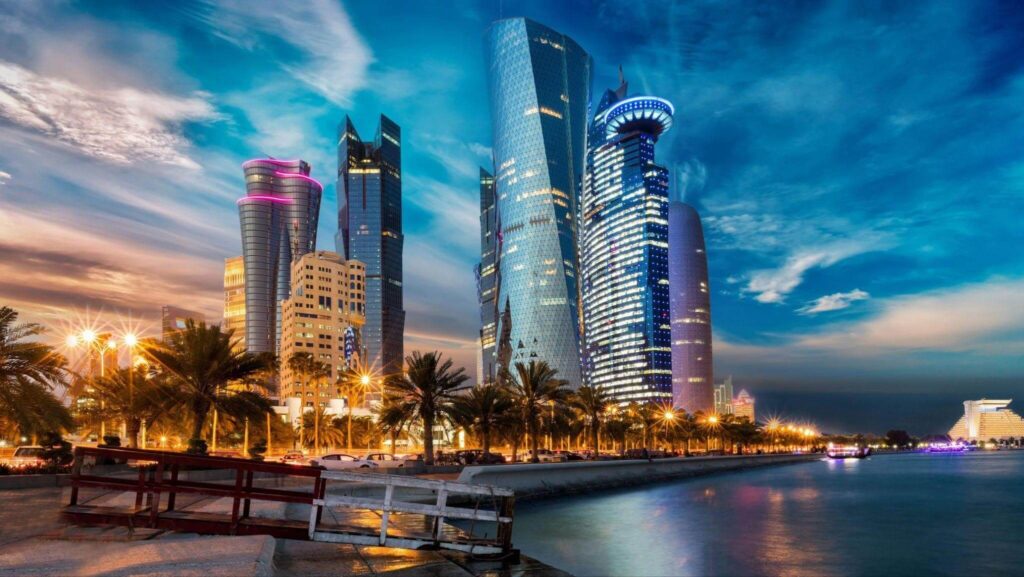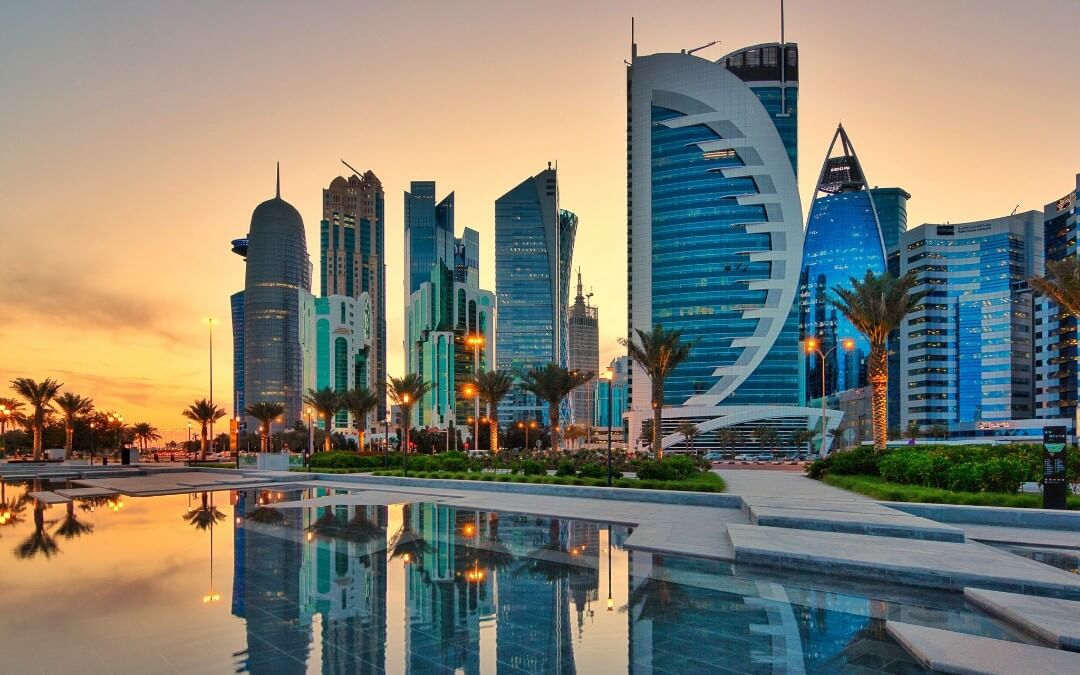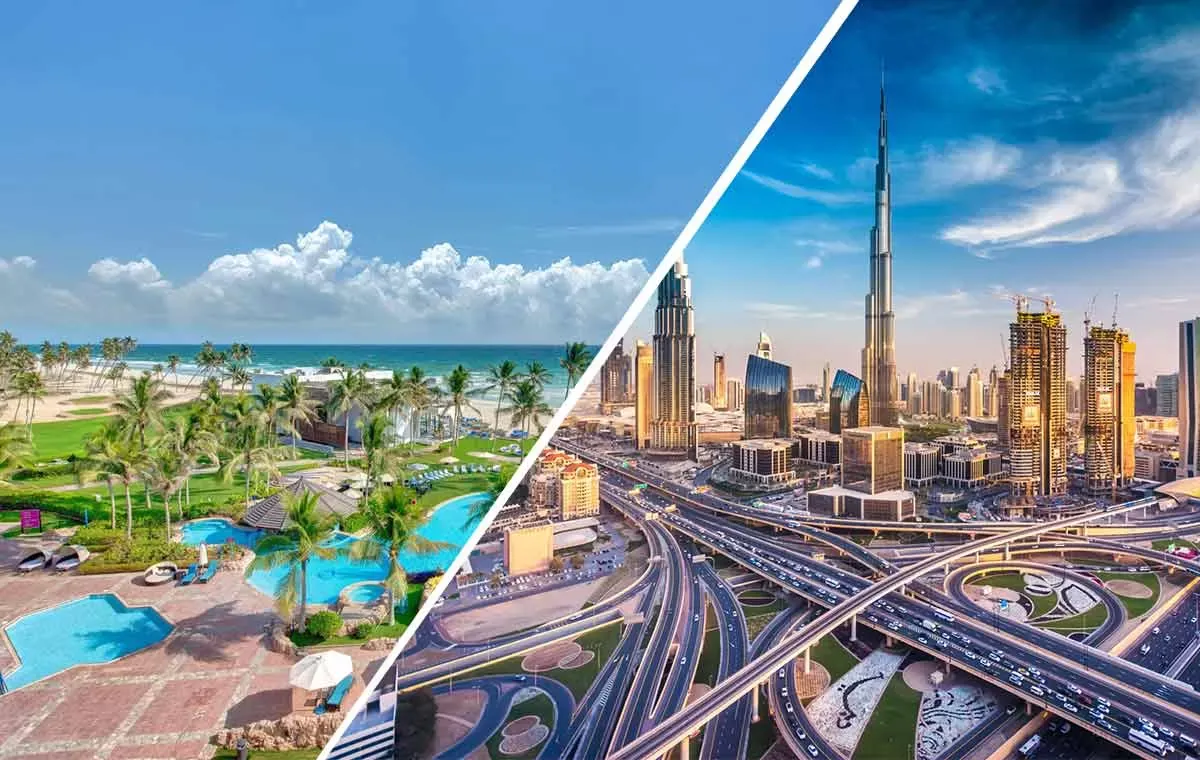Qatar is an Arab country in the Persian Gulf, often referred to as an “economic miracle.” Until recently, it was an unknown land of harsh deserts, scorching winds, and seemingly unpromising living conditions for civilized people. However, now it ranks high in global economic ratings (and beyond).
Its four hundred years as part of the Ottoman Empire, followed by British jurisdiction in the 20th century, are now history since Qatar gained independence in 1971. The rapid development began with extracting natural resources: gas and oil. The development of this sector was taken under state control.
Today, Qatar is one of the world’s major gas and oil exporters. The substantial income generated allows the native population to practically not engage in work. The government offers attractive conditions for doing business, aided by a developed economy, modern infrastructure, and low taxation.

About the Country in Numbers
Here are some facts about Qatar:
- Area: 11,586 square kilometers.
- 7 municipalities.
- Population: 2,846,118 people (according to the 2020 census).
- There are twice as many men as women: 2,034,518 versus 811,400 (2020 data).
- Urban residents account for 99.38% (2017) of the country’s population; most of the urban population resides in the capital, Doha.
- Percentage of immigrants: 88.4%.
- Percentage of the population living below the poverty line: 0%.
- 3rd place in the world (along with Algeria and Malaysia) in liquefied natural gas exports.
- 3rd place in the world in natural gas reserves.
- Agriculture covers only 10% of food needs.
- Property tax: 0%.
- GDP: $100,040 per capita (4th place in the list compiled by the IMF and World Bank).
- 5th place in economic competitiveness in the IMD ranking.
Despite the subtropical climate with humid summers, where temperatures rise to +46°C in the shade, and winters with minimal rainfall, Qatar is one of the most attractive countries to live in.
The History of Qatar’s Development
For centuries, the country was poor in natural resources. After all, the Arabian Peninsula is a rocky or sandy desert with rare oases suitable for livestock farming and agriculture. Due to the hot climate, Qatar lacks permanent freshwater, as the small rivers that form after winter quickly dry up.
Throughout history, the country did not play a significant role in the global economy. But everything changed with the onset of oil production.

The beginning of oil exploration in Qatar dates back to 1939 when the country was under British jurisdiction. The exploitation of oil fields had to be interrupted due to World War II, but work resumed in 1947. Two years later, in 1949, the first tanker carrying 15,000 tons of oil set sail for Europe.
Since the 1960s, the British company Shell Co.-Qatar, which obtained a concession in Qatar’s territorial waters, began developing mineral deposits in the coastal zone.
However, in September 1971, Qatar became an independent state. The state bought out the concessionaires’ capital, and in 1975, the government took control of the companies engaged in oil production. Qatar began independently controlling foreign businesses’ activities, which became a catalyst for prosperity.
How Qatar Became Rich?
Today, Qatar is one of the world leaders in oil and gas production. In 2022, the production capacity for liquefied natural gas reached 106 billion cubic meters per year. Oil and gas are the foundation of Qatar’s economy and the primary source of income, allowing the country to live lavishly. Mineral resources account for 50% of the GDP. This constitutes 70% of the state budget’s revenue.
95% of Qatar’s liquefied natural gas exports go to Asian countries: Japan, South Korea, Singapore, Thailand, and India. The government does not sell its resources to Europe because the requirement to not sell gas beyond the continent contradicts European Union legislation.

The secret of Qatar’s “economic miracle” lies not only in its underground wealth. The state’s policy accompanies success and prosperity. Qatar is one of the few absolute monarchies worldwide where power is passed down through inheritance. An Emir rules the country. It is Tamim bin Hamad Al Thani, a member of the Al Thani dynasty.
Qatar’s economic boom coincided with his father’s reign, Hamad bin Khalifa. The policy of the dynasty’s representatives aims to maximize the benefits of oil and gas exports while minimizing the country’s dependence on fossil fuels. Therefore, Qatar is actively developing other economic sectors.
More about the Oil and Gas Industry
Today, production capacities for processing natural gas into liquefied form are expanding. Since 1997, the development of one of the world’s largest gas fields, the North Field, located in the eponymous part of the Arabian Peninsula, has been ongoing. The offices of global oil and gas industry leaders such as Royal Dutch Shell, ExxonMobil, and others are located in the capital, Doha. Thanks to their participation, the exploitation of deposits occurs with the implementation of modern technologies.
At the heart of the country’s industrial sector, Ras Laffan hosts the world’s largest natural gas processing plant, RasGas. The production capacities encompass 7 lines. The Qatargas enterprise has four strings. Thanks to resources, the quantity of which the country surpasses any other in the world, Qatar not only survived the global crisis in 2008 but also increased its economy by 11%.
Different Sectors of Qatar’s Economy
While the prosperity of the Arab country is based on the processing and export of oil and natural gas, the government, led by the Emir, is actively working on the development of non-oil sectors. The state invests in logistics. Qatar has deep-water ports such as Doha, Hamad, and others, through which a quarter of the Middle East’s cargo passes.
The capital airport has become a hub: it is used by approximately 50 million people per year, starting from just four aircraft in 1997. Since 2011, Qatar Airways has firmly held its position as one of the world’s best airlines.
Communication and IT technologies are actively developing in Qatar. It is one of the first countries to have a 5G network. The state assists both large corporations and medium-sized and small entrepreneurs. It is possible to obtain a loan with an interest rate of 2.5–7% per year. To receive assistance, it is sufficient for the owner of 51% of the shares to be a Qatari citizen.
Although the oil and gas processing industry remains the main one in the country, chemical and metallurgical sectors are also active. Enterprises for processing imported steel operate in Umm Sa’id. Tourism and hospitality contribute 25% to the GDP. However, it is not Qataris but migrants — Pakistanis, Indians, Iranians, and people from other countries who are employed in this sector.
Qatar’s agriculture is poorly developed due to the unsuitable climate. Nevertheless, dates are grown in the oases of the northern part of the country, and nomads across the territory are engaged in breeding goats, camels, sheep, and other livestock.
Quality of Life in Qatar
A developed economy positively affects all aspects of life: healthcare, education, taxation, and national security. Qatar boasts one of the lowest crime rates in the world. Here, healthcare and education are free. Thanks to high salaries, residents can bring any ideas to life. However, the benefits of civilization in full are available only to native Qataris and those who have obtained citizenship.
To become a citizen of this country, one must invest $3 million; for a woman, additionally, marrying a Qatari is an option. The reverse situation, where a foreign man marries a Qatari woman, is not a condition for citizenship acquisition.
Although Qatar is a wealthy country, prices here are as high as salaries. For comparison, lunch at a restaurant costs around $50, a taxi ride — $15, a room in a two or three-star hotel will cost you $230, and for utilities, on average, you will have to pay $270. One should be prepared to spend a substantial amount for renting or buying housing: in Qatar, 1 square meter costs $1,800. No wonder this country is considered one of the most expensive in the Middle East.
How to Start Your Business in Qatar?
Entrepreneur to open a company in Qatar should choose the form of ownership, can be formalized for example:
- A trust.
- An investment club.
- A family office.
- A limited liability company (LLC).
- A holding.
The most popular form of doing business is a private limited liability company. It is important for 51% of the shares to be owned by a Qatari citizen and the remaining 49% by a foreigner. Such a restriction, set by the Ministry of Commerce and Industry, may be revised in each specific case. A foreign businessman can own 100% of the shares if this is possible in a specific sector — agriculture, information technology, tourism, healthcare, entertainment, and education.
Before opening a business in Qatar, it is important to study the tax system. Legal entities pay a 10% income tax. Those engaged in the oil and gas sector are required to pay 35% monthly. The tax on interest is 10%, and on royalties — 5%. The corporate tax rate is 0%.
Advantages of Cooperation with Dynasty Business Adviser
Qatar is the wealthiest country in the world due to its lack of VAT, absence of employee insurance contributions, and the combination of robust economic freedom and political stability. These conditions make the country an excellent choice for doing business. However, the company registration process has its peculiarities in this country. Therefore, entrusting the establishment of a company to experienced assistants like those at Dynasty Business Adviser is worthwhile.
Our staff are certified specialists in tax planning and international law. We assist in resolving any issue, regardless of its complexity. Here’s why you should turn to Dynasty Business Adviser:
- We assist in resolving issues related to corporate law, taxes, and finance.
- We accompany you at all stages of registering your business in Qatar.
- We provide maximum support to solve each client’s specific issue thanks to our approach.
Over 8 years, Dynasty Business Adviser has helped around 400 clients and conducted over 4,000 consultations. We are available 24/7 and promptly attend meetings. The most significant benefit of working with us is comprehensive services in opening a business in Qatar. We handle formalities such as document legalization, accounting support, and opening bank accounts. We engage in planning and organization. For a full consultation (since the above text is for informational purposes only), it is worth contacting Dynasty Business Adviser managers for professional assistance.









